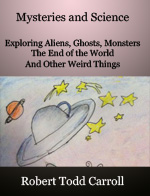From Abracadabra to Zombies
gods
In a nutshell: Gods are beings with unnatural powers who never die. Some are believed to be the controllers or creators of various parts of nature. Many are thought to require worship and obedience from humans. These gods reward or punish us depending on whether we please them.
Stories of gods have been told in most societies that we know of going back at least 10,000 years. Gods are portrayed as beings who never die, with mighty powers, able to make nature do what they want. Most gods are pictured as being born and having parents. Some stories show gods as being able to change the weather and cause mighty storms, floods, earthquakes, or volcanic eruptions. For the most part, scientists have replaced stories about gods with scientific explanations of how the universe was formed and how humans and other living creatures evolved.
In stories, gods my be invisible or visible. They may take on the form of humans or other animals. They may require humans to make sacrifices to them and worship them. Many stories show gods as rewarding or punishing people depending on how well we have obeyed their orders.
Some people believe in many gods (polytheists). Some believe in one god (monotheists). Some do not believe in any gods (atheists). Some believe that we cannot know whether any gods exist (agnostics).
Some people believe that we wouldn’t know the difference between right and wrong unless some god told us. Others believe that most of us can figure out the difference between right and wrong on our own.
Many people ask, if there are no gods, then how did the universe come to be? Others ask, How did any gods come to be? The answer to the first question is that the universe came to be by natural laws acting on matter and energy. The answer to the second question is that humans created gods in stories as a way of explaining things we didn't understand.
Last updated


